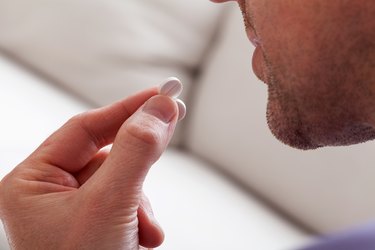
When early-morning grogginess or a mid-afternoon slump has you dragging through your day, caffeine calls to you. For many, a cup of coffee or tea suffices, but others reach for over-the-counter caffeine pills.
Caffeine, despite being an addictive substance, is generally recognized as safe by the U.S. Food and Drug Administration (FDA). And caffeine pills contain approximately 100 to 200 milligrams of caffeine per pill (about the same as a cup of coffee), but it's important to make sure to stick to an appropriate dosage (keep reading for more on that).
Video of the Day
Video of the Day
However, in April 2018, the FDA took measures to ban pure and highly concentrated caffeine powder from the market because of the difficulty in measuring out the correct dosage of 1/64 to 1/16 of a teaspoon, or 50 to 200 milligrams of caffeine. Caffeine pills, on the other hand, are still legal and available because the caffeine they contain is pre-measured and packaged, so the consumer doesn't need to do any measuring on their own.
How Do Caffeine Pills Work?
Caffeine affects your body in the same way, whether it's in pill form or beverage form. It works by mimicking adenosine, a compound that's produced as a byproduct as your neurons fire when you're awake.
When your adenosine levels decrease, your body think it's getting ready for sleep. Caffeine mostly targets the A1 receptor, and it takes about 5 to 6 hours for your body to process it, meaning that's the time you're going to stop feeling the effects of the caffeine you consumed.
What you will feel, however, is the stimulation of your central nervous system, which is what gives you that boost of energy. You'll feel caffeine's peak effects around an hour after taking a pill. However, caffeine has a few other effects:
- It's a diuretic, so it will cause you to urinate more.
- It increases stomach acid, which can lead to a stomachache or heartburn.
- It increases your blood pressure.
- It could inhibit your body's absorption of caffeine.
What's the Correct Dosage for Caffeine?
A standard dose of caffeine is considered to be approximately 200 to 400 milligrams per day. The amount of caffeine in popular forms include:
- 14-ounce coffee: 210 milligrams
- 2-ounce espresso: 150 milligrams
- 16-ounce decaf coffee: 10 to 25 milligrams
- 8-ounce black tea: 47 milligrams
- 12-ounce diet cola: 46 milligrams
- 16-ounce energy drink: 160 milligrams
- 1 tablet NoDoz or Vivarin: 200 milligrams
- 2 tablets Excedrin Migraine: 130 milligrams
- 1/16 teaspoon caffeine powder: 200 milligrams
However, the amount that's considered safe varies from person to person because caffeine is metabolized differently based on body composition and genetic background. If you're going to start taking caffeine as a daily supplement, discuss the dosage with your physician first.
Read more: The 12 Worst Coffee Drinks to Order
Side Effects of Caffeine Pills
Caffeine pills might be advantageous for staying awake when you're feeling groggy, but they come with side effects. They can make certain mental health conditions worse, such as anxiety disorder and bipolar disorder.
Caffeine can also affect physical health conditions like epilepsy and irritable bowel syndrome, including diarrhea. It can increase blood pressure in those who are already susceptible to high blood pressure, and it boosts the amount of calcium flushed out in urine, increasing the risk of osteoporosis.

Can You Overdose on Caffeine Pills?
In short: Yes, it's possible to overdose on caffeine pills. The maximum daily dose should not be over 400 milligrams, according to the FDA. Mark Jabro, M.D., an internal medicine specialist with Sharp Health Care in San Diego, says that pregnant women should consume no more than 200 milligrams.
Be especially careful of pills and powders, as the caffeine is highly concentrated. In fact, the FDA warns consumers about the potential overdoses on pure caffeine powder, saying, "These products are essentially 100 percent caffeine. A single teaspoon of pure caffeine is roughly equivalent to the amount in 25 cups of coffee."
Symptoms of a caffeine overdose can include:
- Dizziness
- Agitation
- Confusion
- Convulsions
- Breathing problems
- Irregular heartbeat
- Nausea or vomiting
- Rapid heartbeat
- Diarrhea
- Fever
In severe cases, a caffeine overdose can lead to death.
Uses for Caffeine
The increase in heart rate and blood pressure you experience from caffeine can temporarily increase your mental alertness. This makes it popular with people who need to stay away for a long time like long-haul drivers or students.
Caffeine can also be beneficial for weight loss. "Caffeine can increase the resting metabolic rate and suppress appetite and also increase the levels of adrenaline, which signals the breakdown of fat tissue into energy," says Dr. Jabro. He points out that while the effects are modest, it can be helpful alongside a healthy diet and exercise program.
You may also benefit from a temporary boost in athletic performance from caffeine, since it might make you feel like you don't have to exert as much effort to get through your workout, Dr. Jabro adds. Generally, that means consuming caffeine an hour before a workout.

Benefits of Caffeine
Studies have long touted the benefits you get from caffeine primarily by looking at coffee consumption as a vehicle. However, coffee contains a thousand different chemical compounds, so positive benefits could often be attributed to one those compounds.
A 2012 Harvard Health Letter highlights the fact that some studies show the same results between caffeinated and decaffeinated coffee.
Despite that, both coffee and other forms of caffeine consumption is linked to a number of health benefits. This includes an effect on:
- Insulin resistance. A 2002 study in Diabetes Care looked at how caffeine (through coffee) may help with insulin sensitivity, a main concern for anyone managing their diabetes. The study indicated that increased adrenaline levels coming from caffeine may be the contributing factor to this improvement.
- Depression. Research has also shown that caffeine is protective against things like depression and suicide due to the increased adrenaline, according to Dr. Jabro.
- Alzheimer's. A review of studies published in 2015 in The Journal of Nutrition Health and Aging found evidence that suggested a positive effect of coffee, tea and caffeine on dementia, though it noted that more research is needed.
- Parkinson's Disease. Researcher found a positive link between caffeine consumption in men and reduced risk of Parkinson's Disease, noting that decaffeinated coffee did not have the same effect. No effect was found in women.
- Multiple Sclerosis. A review of two large studies published in 2016 the Journal of Neurology, Neurosurgery and Psychiatry concluded that caffeine specifically reduced the risk of multiple sclerosis.
Read more: 14 Legit Ways Coffee Can Boost Your Health
Caffeine's Interaction With Drugs and Alcohol
While there may be many benefits to caffeine, it should not be used by people with several different health conditions, including:
- Uncontrolled hypertension (high blood pressure)
- Cardiac arrhythmia
- Seizure disorder
- Severe liver or kidney disease
- Insomnia
- Anxiety/panic disorder
- Unstable coronary disease
- Recent heart attack or stroke
- Gastric ulcers.
You might also find yourself at greater risk for an adverse reaction or engaging in risky behavior if you mix caffeine and alcohol. Dr. Jabro points to a 2008 study from the Academy of Emergency Medicine that highlights the risk of alcohol-related negative consequences when you mix caffeine with alcohol.
You might not ever be inclined to order a Red Bull with vodka, but if you pop a caffeine pill and sip a Chardonnay you could be faced with the same effect. Many drugs actually increase caffeine's effect, meaning you could have side effects like lightheadedness, rapid heart rate and even fainting with little to no warning.
Popular antibiotics Cipro and Enoxacin, along with muscle relaxer Zanaflex, can lead to caffeine overdose symptoms. Caffeine limits the effectiveness of other medications and can even render them harmful; mixing caffeine with Lithium can cause Lithium toxicity in the blood leading to nausea and tremors.
The Bottom Line
When taking caffeine pills or pure caffeine powder, take care to consume the recommended dose and not more. If you're concerned about side effects or contraindications with other drugs or supplements you're taking, be sure to check with your doctor to determine if this is the right option for your health needs.
- Food and Drug Administration: Pure and Highly Concentrated Caffeine
- Harvard Health Letter
- Diabetes Care: Caffeine can decrease insulin sensitivity in humans
- Academy of Emergency Medicine: Caffeinated cocktails: energy drink consumption, high-risk drinking, and alcohol-related consequences among college students
- MedlinePlus: Caffeine Overdose
- Mayo Clinic: Caffeine: How Much is Too Much?
- National Sleep Foundation: How Caffeine Works
- National Institutes of Health-Medline Plus: Caffeine